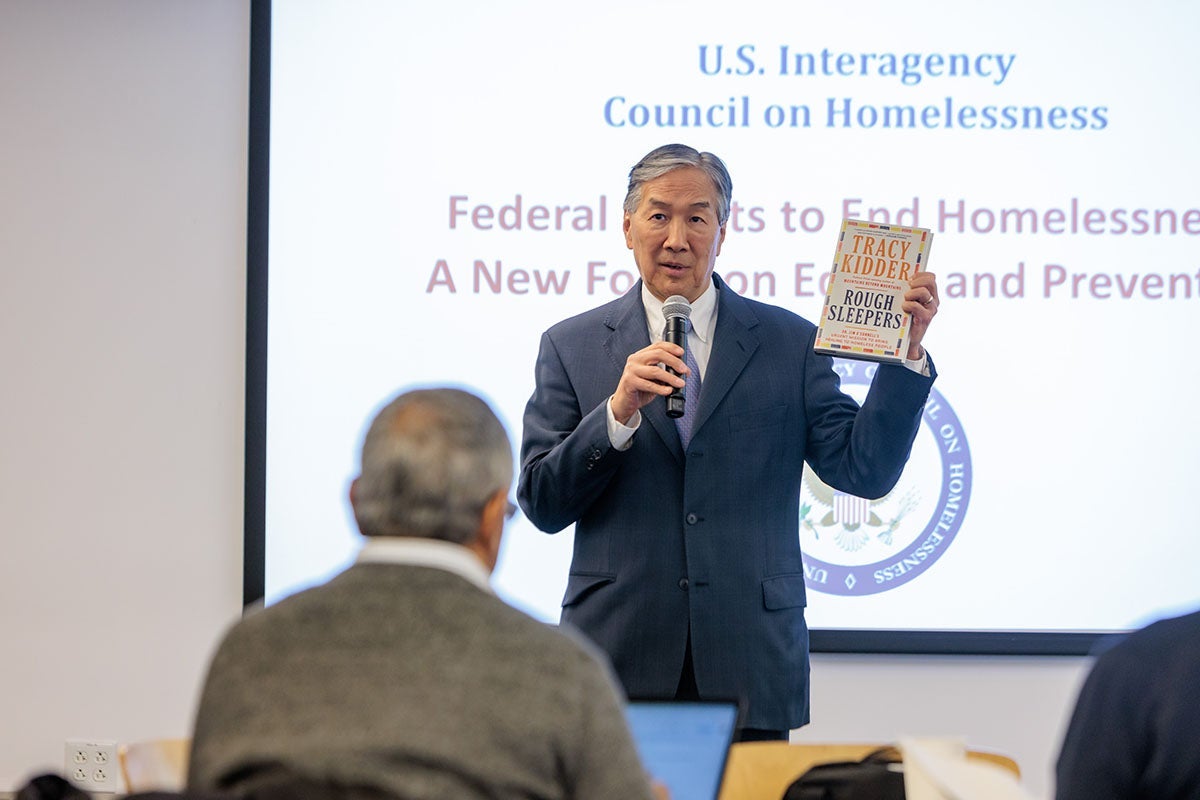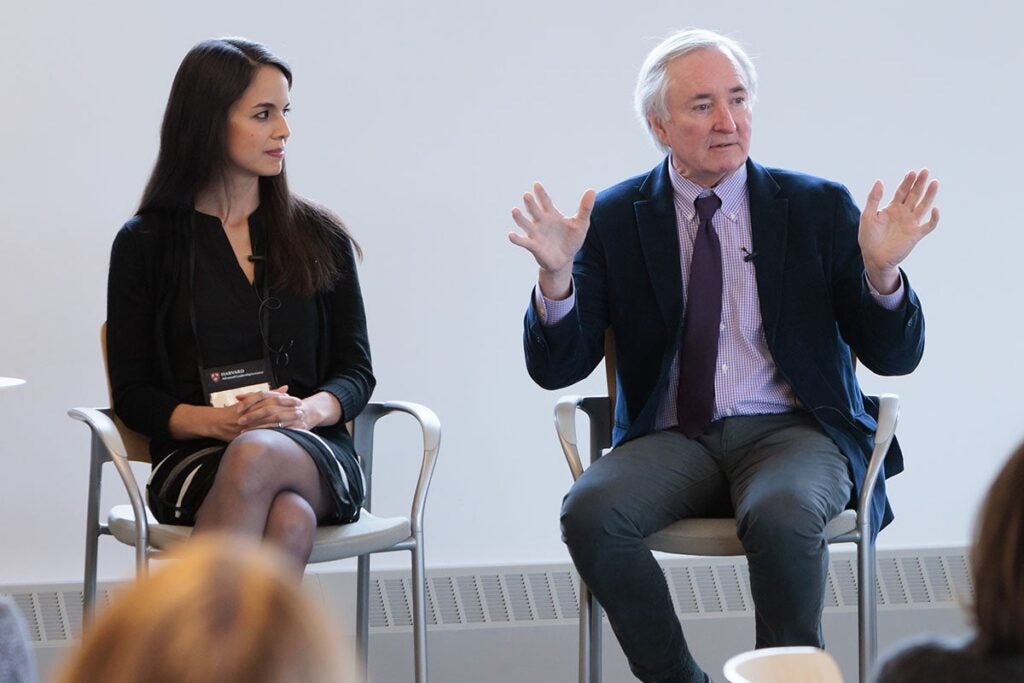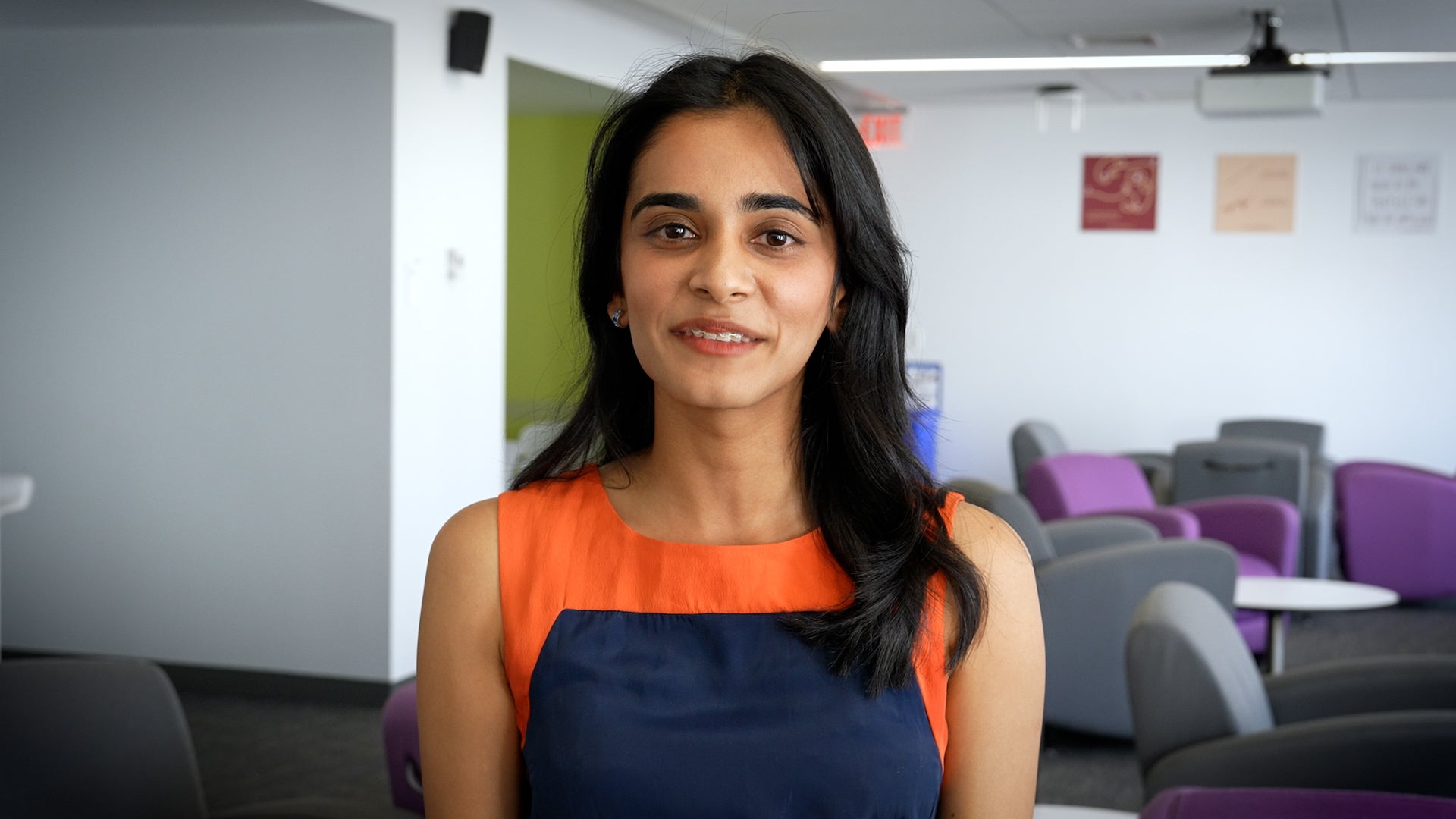Complexities of homelessness explored at ‘deep dive’ event

April 6, 2023 – Many facets related to the problem of homelessness—including its prevalence, causes, relationship to health, and ways to respond—were on the agenda at a two-day conference at Harvard University in late March.
The event, held at Harvard Business School, was co-hosted by the Initiative on Health and Homelessness (IHH) at Harvard T.H. Chan School of Public Health and the Harvard Advanced Leadership Initiative (ALI). Attendees included ALI fellows, practitioners in the homelessness arena, researchers, and students.
In opening the conference, Howard Koh called homelessness “one of the toughest and most important societal issues in our country right now.” Koh, Harvey V. Fineberg Professor of the Practice of Public Health Leadership at Harvard Chan School, is faculty chair of IHH and a member of the faculty executive committee for ALI.
He posed a series of questions to the approximately 90 ALI fellows who attended the event. “How did we get to this?” he asked. “What’s causing this? What does this say about our society when we allow this failure to fester year in and year out and get increasingly more visible? What are the possible solutions to this? Who is doing research on this? Who is responsible? As a society, do we believe that people experiencing homelessness deserve care? And if the answer is yes, what can I, or we, do about it?” He concluded, “Those are the questions of the next two days.”
Speakers at the event included researchers, state and federal officials, representatives from nonprofits, health professionals, and people who’d experienced homelessness in the past.
Social scientist Dennis Culhane of the University of Pennsylvania discussed trends in homelessness, factors that contribute to the crisis, and evidence-based solutions. He offered facts that highlight the prevalence of the problem, noting that about 580,000 people are homeless in the U.S. on any given day—although that number is likely an undercount—and that roughly 2 million people experience homelessness each year. Outlining demographics, Culhane said that most of the homeless population are adults, followed by families, the chronically homeless (people homeless for more than a year), veterans, and unaccompanied youth. Blacks account for 40% of the homeless population, while Asian/Pacific Islanders, mostly concentrated in Hawaii, have the highest rate of homelessness.
Homelessness is actually declining, Culhane said—except for on the West Coast. Noting that roughly a quarter of the homeless population lives in California, he said that while people may believe that the state’s warm weather contributes to its large homeless population, he thinks it more likely because the West Coast never had as much social welfare infrastructure as East Coast locations—meaning that people who find themselves homeless have fewer places to turn for help.
One of the top reasons people become homeless is lack of access to affordable housing, according to Culhane and others who spoke at the event.
Jen Molinksy, senior research associate at the Harvard University Joint Center for Housing Studies, pointed out that, in addition to high housing costs, there’s simply not enough housing in the U.S., particularly starter homes and public housing. In a study that she and colleagues are currently conducting on housing insecurity and homelessness in Boston, they found “ridiculous” barriers to people securing affordable housing—such as not being able to get to a government office to file paperwork because it’s a train ride away.
Other speakers at the event included Va Lecia Adams Kellum, CEO of the Los Angeles Homeless Services Authority, who spoke about the causes of homelessness in LA and how the city has worked to address the issue; Jeff Olivet, executive director of the U.S. Interagency Council on Homelessness, who discussed federal efforts to end homelessness; and representatives from two nonprofits—Community Solutions and the Homeless Children’s Network—who outlined their strategies for addressing homelessness.

The event also featured Jim O’Connell, president of the Boston Health Care for the Homeless Program (BHCHP) and the subject of a January 2023 book by Tracy Kidder, Rough Sleepers: Dr. Jim O’Connell’s Urgent Mission to Bring Healing to Homeless People. O’Connell and Katherine Koh, psychiatrist on BHCHP’s Street Team, discussed how “street medicine” works; dispelled the misconception that most people experiencing homelessness suffer from schizophrenia, although they do contend with other mental health problems such as depression, anxiety, and trauma; and spoke about the importance of integrating medical, psychiatric, and substance use disorder care for “rough sleepers”—those who sleep on the streets—when they are placed in permanent supportive housing.
Two people who’d experienced homelessness themselves in years past and who are now members of BHCHP’s Consumer Advisory Board—Derek Winbush and Joanne Guarino—told harrowing tales of difficulties they’d faced over the years that led to their bouts with homelessness, including violence at home, substance use, HIV, and sexual abuse.
O’Connell asked them for advice on what people should do if they encounter someone on the streets who is homeless and asking for money.
“Treat them as a human being, with dignity and respect,” said Winbush. Guarino agreed. “You don’t know what people are going through,” she said. “Remember that they are somebody’s somebody.”
As for solutions, Winbush emphasized the importance of seeking input from people who have experienced homelessness, noting, “Maybe they have some ideas that you aren’t even thinking about.”
photo: Russ Campbell
Note: This article was updated on April 7, 2023.


